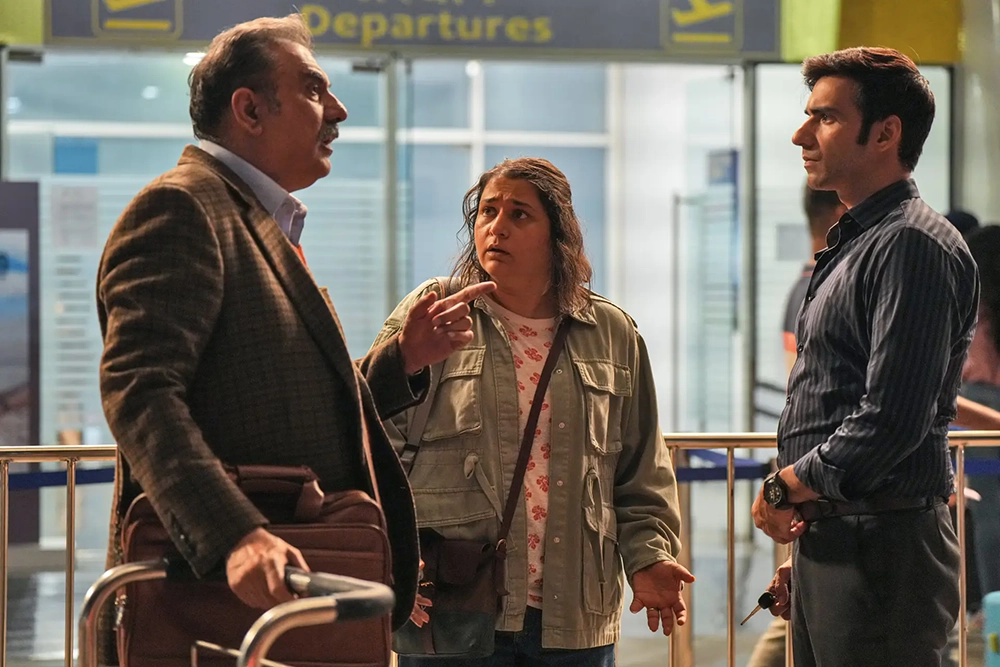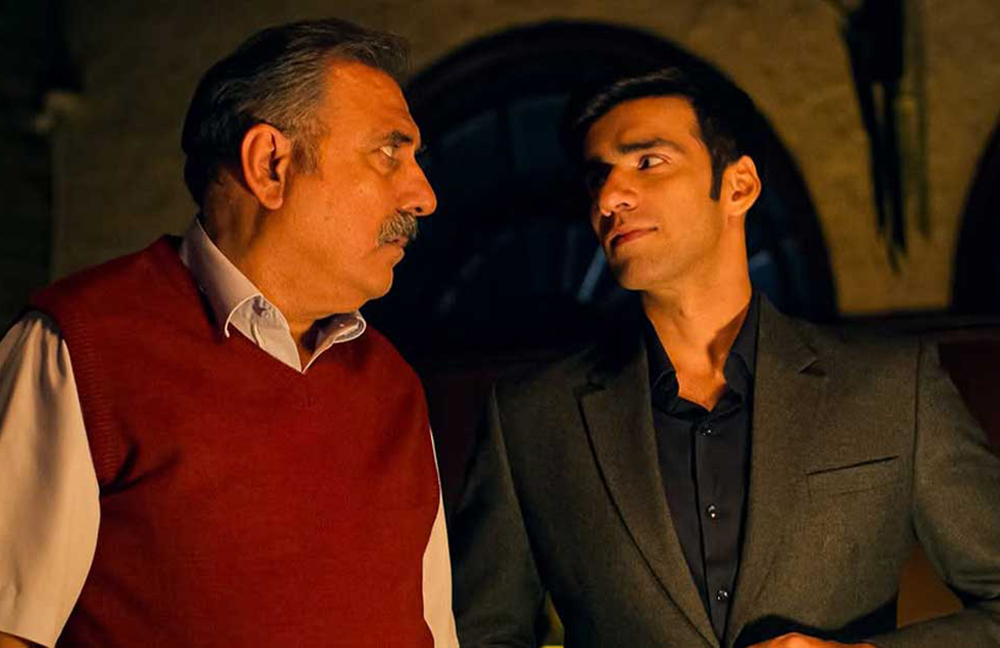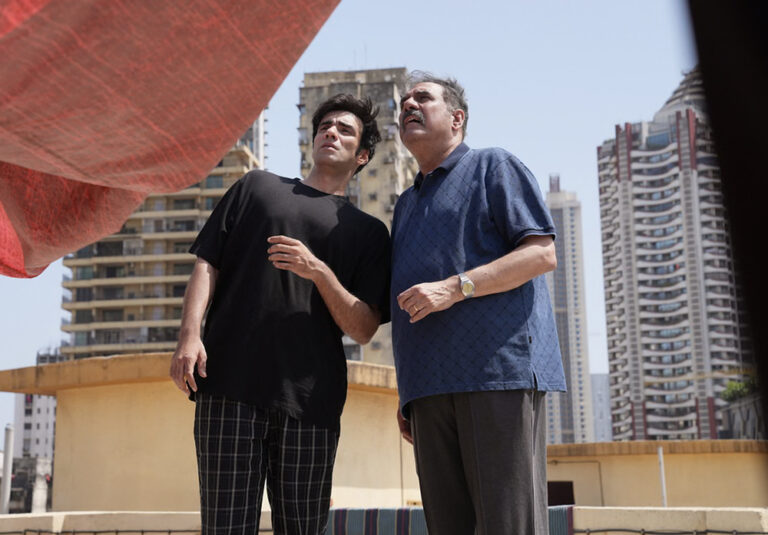In “The Mehta Boys,” due to a delayed flight, Shiv Mehta (Boman Irani)—an elderly widower with so much pride he can’t even stand splitting the bill during an expensive meal—hesitantly moves in with his son Amay (Avinash Tiwary) at the latter’s apartment for a couple of days. A series of unpredictable events including a power outage and a flash flood serves as a test of the strength of their brittle relationship. These result in the titular Mehta boys venting out their cooped-up frustrations. The navigate an emotional as well as generational gap, a delayed sense of grief (particularly for Amay), and connecting over home-cooked meals, all of which almost brings them back on talking terms.
While at first glance it appears that a dad is the best and simultaneously most distracting flatmate a son could ask for, soon enough tiny annoyances transform into full-blown temper flare-ups. Arguments are left unresolved and things left unsaid, as both Shiv and Amay stubbornly refuse to let the other get the last word in. And with time running out before either of them can apologise or settle their issues amicably, this temporary living arrangement threatens to grow more unhealthy and stormier than the persistent Mumbai monsoons.
Boman Irani and Alexander Dinelaris Work Together Well
Thespian Boman Irani teams up with Oscar-winning screenwriter Alexander Dinelaris (of “Brdman” fame) in “The Mehta Boys” to craft a splendid directorial debut that’s driven by its intricately constructed conversations. An emotional note penned by Irani on social media in which he opened up about not knowing his own father (who passed away before he was born) also offers much insight into his personal motivations in writing this dramedy. It’s centred on a fragmented relationship, translating this sense of emptiness or need for closure to the big screen through the bittersweet story of a father and son who live together, yet who are never on the same page, nor fully understand each other completely. The direction and storytelling further lend depth.
“The Mehta Boys” not only excels in exploring the strengths, but doesn’t shy from addressing the weaknesses of a father who shows both love and disappointment via mixed signals. On one hand, Shiv enthusiastically wading through waist-high water with fresh groceries and cooking for his workaholic son. This is in addition to using his quick reflexes to catch a raindrop with a utensil before it drips onto important papers in Amay’s leaky (but expensive) apartment, which showcase his selfless nature. Yet his flaws are as clear as day, too, whenever he inadvertently passes condescending remarks at his son’s dependence on technology for work, stemming from ingrained arrogance over changing times and changing work practices.
Giving a Fresh Perspective
These scenes of course further showcase how Mehta Sr. is still seemingly stuck in the old black and white “Laurel and Hardy” era. His ‘back in my day’ style of parenting—while meant to be well-intentioned—also has the opposite effect and comes across as him talking down to his son who retaliates with equally hurtful retorts. The awkward dinner table conversations that follow in fact largely mirror those of “A Real Pain,” another movie that revolved around emotionally distant relatives and sensitive themes of grief and growing pains. Similarly both movies conclude with a final act at an airport departure terminal that hits viewers emotionally.
The characterisation of Shiv is also a breath of fresh air, since unlike the antagonistic strict fathers of ’90s Bollywood (i.e. the late Amrish Puri playing a disapproving family patriarch in pretty much any romantic melodrama), “The Mehta Boys” offers a more humanised portrayal. While his ‘father knows best’ attitude can be repetitive, grating and stifling, Shiv also hides a jovial side. He is a thorough gentleman when he is introduced to his son’s fiancée and work colleague Zara, teasingly referring to her as Amay’s soulmate.
One also realises that beneath Shiv’s bouts of bitterness lies an inner conflict that gnaws at him. After the recent passing of his wife and soulmate, he is left to contemplate relocating to America to live with his daughter and grandkids, thus uprooted from the only place that he calls home and from the cherished memories he’d built from the ground up. After all, home and memories don’t exactly fit into a taxi. Being a cricket enthusiast who enjoys a match or two with the local kids in his neighbourhood, he also worries of the abrupt cultural or lifestyle switch-up, sullenly asking Amay whether Americans play cricket.
Striking Imagery Throughout

Shiv’s occasional toxic tendencies aren’t normalised either, and the movie also pulls focus to Amay’s dilemma in looking after a stubborn father who isn’t too keen on being coddled by his adult son. It is but imminent that the stress of being a perfect son to a father who has always prided himself on being self-sufficient takes its toll on Amay. This sentiment is also shared by his boss, a man who is closer in age to Shiv and perceives his inheritance as a ticking time bomb. Plagued by unresolved insecurities, he opens up to his star employee about his own father renaming the architecture firm as ‘Sen & Son.’ It’s a name that serves as a reminder of his long-deceased father’s looming shadow and a legacy that’s become a crushing burden, simultaneously leaving him questioning his own self-worth, much like young Amay.
Striking imagery (a majority of which are architecture motifs in keeping with Amay’s profession) also plays a part in the storytelling, lending meaning to as well as aiding in the development of character arcs. These range from the unfathomable strength of the underestimated Purlin beam to a flimsy, perilous tarp that is only a temporary band-aid for healing wounds.
A Commentary on Rigid Social Norms
The movie’s also an exemplary deconstruction of rigid social norms and hegemonic masculinity which cage the modern man. In both his professional and personal life, Amay holds back from shaking up the foundations and calling out hypocrisies. At his workplace, he refrains from presenting his unique and ‘old fashioned’ ideas to the higher-ups, who push forcont emporary minimalism, which is already on its way out (a metaphor for the obsolete and outdated concept of machismo). Due to a lack in asserting dominance, Amay is captive to the countless monotonous briefs that he’s ‘programmed’ into following and has become a doormat. A similar mentality is reflected in Shiv; he’s a child at heart, yet forced to conform to societal norms which expects a man to show his children tough love. However, much like the sagging roof of Amay’s high-rise apartment, he ultimately can’t help but cave to the inner child within.
Boman Irani can best be described as a homegrown Paul Giamatti, and he effortlessly slips into the shoes of the flawed but still utterly likeable Shiv. He balances physical comedy and the comically-overdramatic nature of this character with the more complex emotions of his character. A scene that particularly elicited chuckles from me features him struggling up the last few stairs to Amay’s apartment assisted only by a suitcase that he drags around grumpily like a walker. He conveys the melancholia, cynicism, and intense angry outbursts while steering clear of cliché ‘angry old man yelling at clouds’ territory.
A Touching Movie

Another scene that highlights Irani’s versatility includes a quick switch from a victorious grin to a look of utter devastation after his failed attempt to climb out of an elevator during a power outage. He slinks back into the elevator car with a pained grimace and stewing in contempt for himself. Co-star Avinash Tiwary holds his own, with his eyes speaking volumes as Amay. The women in this movie (Shreya Chaudhry as Zara and Puja Sarup as Anu) also deserve their flowers, especially Sarup standing out with her natural, relatable performance as the daughter who is at her wit’s end after mothering the childish men of the family.
The beautiful visuals by Cinematographyer Krish Makhija too deserve a mention. My personal favourite is a shot of Shiv and Amay engulfed in the effervescent glow of candlelight on a balcony overlooking a sea of minimalistic glass and steel towers which choke the Mumbai skyline. A soulful score featuring the sublime voices of the Shillong Chamber Choir rounds out this touching movie. It teaches viewers that much like a budget planner and the engineering team of a firm, even the most demanding and frustrating of personal relationships require one to devote time and effort. And most of all, it takes work to reach a mutual understanding in ensuring what they’ve build doesn’t come crashing down.



